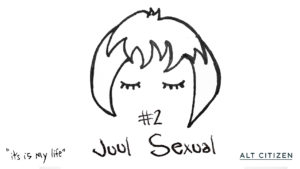Offscreen is a new column by writer, actress, producer, Virginia Rand
Selfing-soothing is the love language of the isolated. Loneliness is the ironic unifier of 2020. We are packed into the confines of our own headspace. The world is harder to experience with all senses, existing mostly visually, through the confines of the square inches of glass in our hands. Physical stimulation has been eclipsed by simulation.
Our bodies are beginning to feel less like organic, conscious matter — and more like extended drives for the input and export of digital communication. The buildup of this circulation can create stagnancy, unreleased tension, and further dissociation from our central nervous systems.
My generation has willfully accepted dissociation, depression, and anxiety, into common lexicon. Millennials already have a sense of identity through navel-gazing, anti-social behavior, and self-deprecating humor. Convergence of heightened pop-culture, internet intellectuals, memes, and porn, shaped our sense of the world. Voyeurism is the cornerstone of our current culture. Atrophy has marred the sense of ambition which drove the youth of the 20th Century. Economically, we have struggled with unemployment and failing to find love in stable relationships. We had been isolated individuals before this. We can look at virtually anything in the world, but not necessarily come into contact with it.
We are a sad and horny generation.
This has peaked in 2020, where much of our lives have to be relocated to screens: careers, education, shopping, art, dating, sex, even funerals. Things that until recently required entering a specific location amongst other people — are now accomplished in the confinements of home. We interact with the world from our desk, couch, bed, or kitchen table.
The running theme of my quarantine orgasms and tears was a direct correlation between decreasing depth and intensity, with heightened screen times. With primarily digital engagement, there was a diffusion in physical intimacy — even alone. Conscious contact and communication offscreen may be a link outside of the digital purgatory that has enveloped our bodies whilst under home confinement. Being able to connect to our humanity by removing the stagnant energy built up via the digital exchange may lie in our most primitive and guttural forms of emotional release.
True to the nature of my generation’s search for catharsis — in long stints of aloneness — rarely a day goes by where I don’t experience tears and/or orgasm. Easily numbed by zombie-like internet scrolling, I have tried to keep screens out of my grief and out of my sex life. The conscious contact of grief and arousal has a physiological vulnerability that allows the body to be consciousness in physical space, rather than in digital space. It is in the moments away from the screen that energetic shifts occur. Solo-grief and solo-sex have a commonality as windows into ourselves.
As #SelfCare trends and morphs into yet another marketing tool, it is important to remember that such care in its purest forms can exist in ritual that needs only the present self. In the wake of orgasm the brain releases oxytocin, the bonding chemical. Alone, this can help us to recognize the person we are inhabiting, rather than seeing a stranger whenever the colors on the screen turn to black, revealing the reflection of a stranger’s face.
Quarantine opened up a trend of people exploring new interests and hobbies, giving rise for opportunities to come into deeper intimacy with identity. We learn incrementally more about ourselves by pushing through difficulties. We have a deeper understanding of self by becoming in tune with what turns us on, and knowing how the body responds to physical stimulation. Coming back into ourselves may be necessary as a gentle reminder to honor the space we take up in our biological being. Our bodies are conduits of love, affection, and expression, but have been feared as transmitters of the virus.
Sensory experience beyond what is presented to us through the glass of our phones, TVs and computers, must be made a priority. A note on pornography: I am not against it in principle. However, I do believe that much of the free porn accessed online deflects focus from more pertinent parts of our sexual sensorium.
In grief, internet distraction can help us through rougher moments. But genuine intimacy with our emotions without digital stimulation can help move it through.
So much has been digitally consumed over the last few months, and expelling it has become necessary as an act of not just self-soothing — but of reclaiming sanity. Our abodes, including our bodies, have become fishtanks; congealed with the grime of the sick mixture of headline news and social media trends, in which we are unable to move more than a few feet, but providing a warped view of the world at 360 degrees.
I rely greatly on the internet for contact with others, for new and different perspectives, for hopefully true information, and as access to the music and film which help shape my understanding of experience. At the same time, withdrawing into ourselves during the quarantine may be compounded by the hours of screen time shooting through our eyeballs. Release is achieved in primal states.
Presence and release of grief and tension may not solve all problems, but can at least preserve our humanity from moment to moment. Despite being a sad and horny generation, we are experiencing a deep shift, which can be an opportunity to practice listening and experiencing, beginning with our own selves. And maybe our hearts don’t have to break incrementally more every day throughout the short remainder of 2020, just as we can’t expect them all to suddenly self-repair at the onset of 2021.
What helped me were moments allowing my body to be alone in its own company. This often led, via this presence, to crying or coming. Perhaps I am a mere product of my generation, but we can combat division by first approaching the divide in the individual.
With thanks to Caroline Bernstein, Natasha Kanury, and Sophie Balaban










